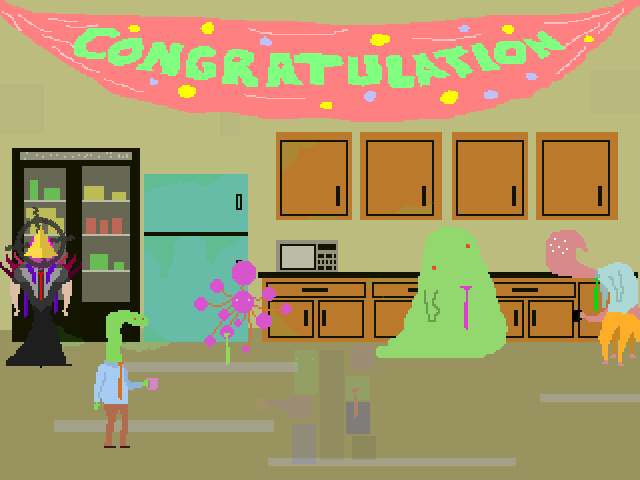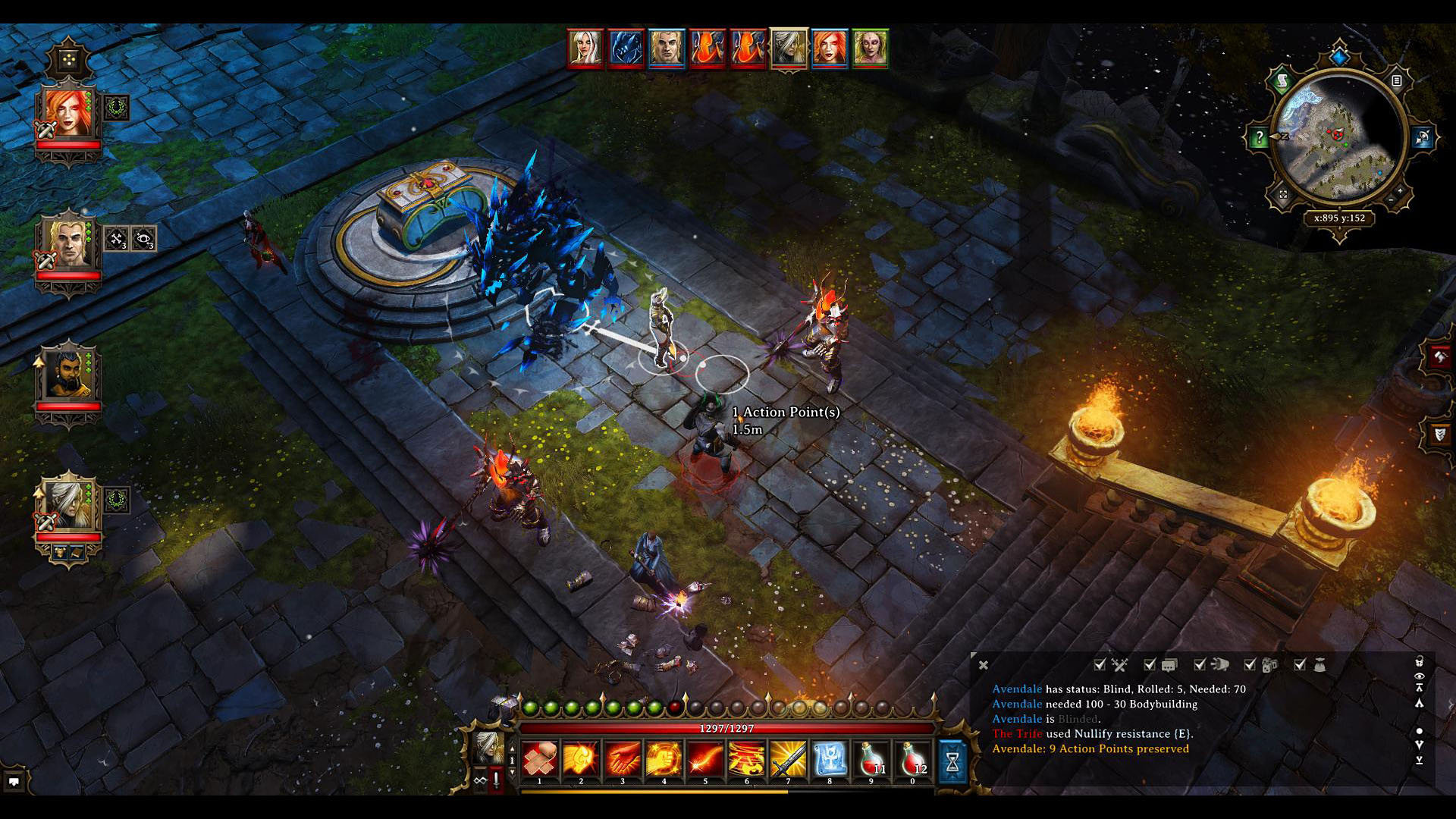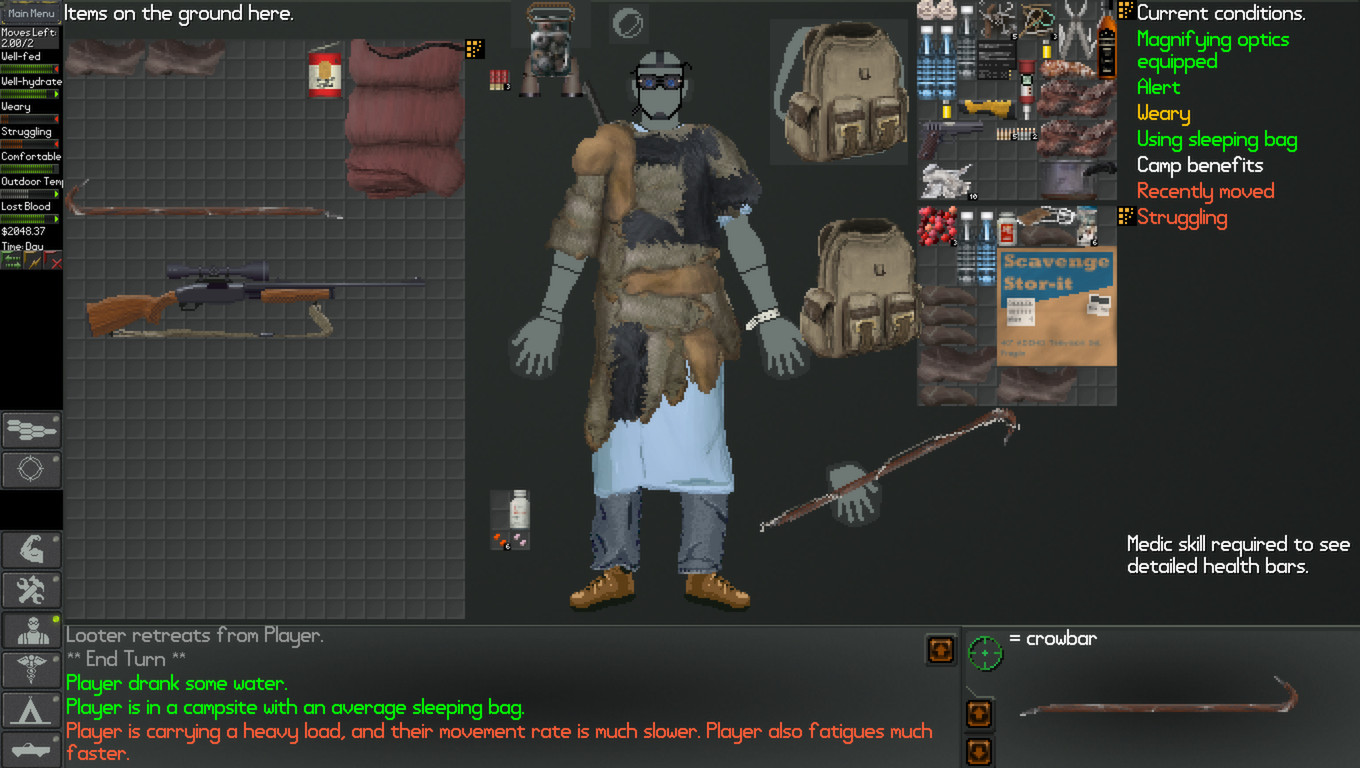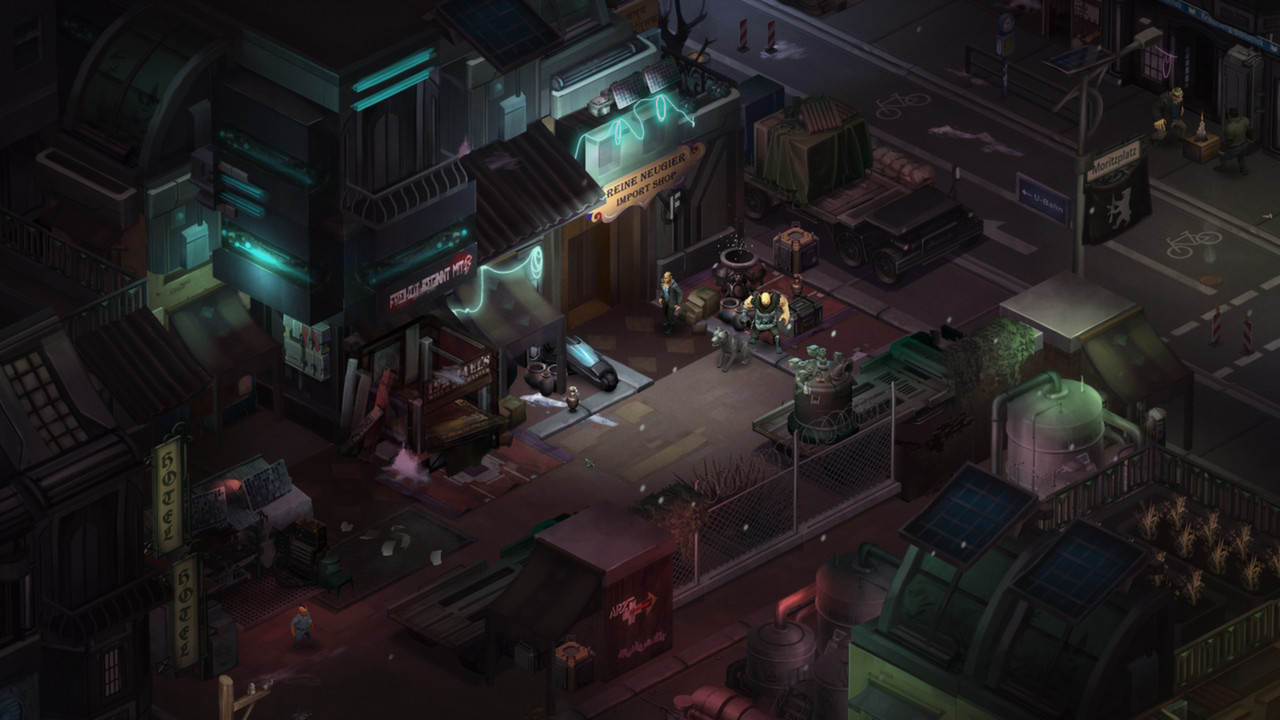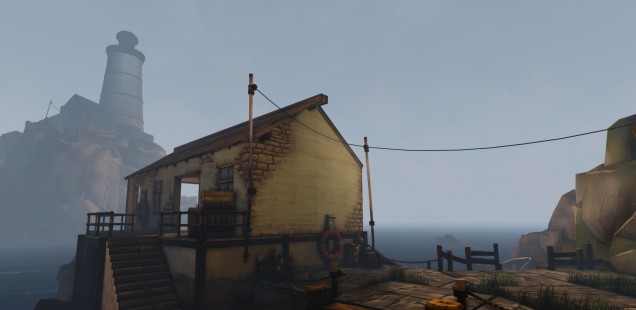
Games of 2014 (15/15)
Games of 2014 concludes with Ether One, Garugol, Divinity: Original Sin, NEO Scavenger, and Shadowrun: Dragonfall.
Ether One
Ether One snatched my attention with its unusual premise, although the gorgeous visuals didn’t hurt much either. It’s a first person adventure game in which the player is a “Restorer”, a radical new form of therapist who enters the mind of their patients Inception-style to restore memories. In Ether One, the patient has Alzheimer’s, and the player must collect fragments of memories in order to put together those which are broken.
First person adventure games are nothing new – Ether One is rightly compared to Myst for its beautiful environments and mysterious atmosphere – but Ether One is its own game. Part of what makes it unique is that there are optional puzzles. You don’t have to solve everything to get through the game, but solving more puzzles reveals more of the story.
Ether One does a fantastic job of mixing gameplay with narrative. If you pay close attention to the little details in the story, you can use them to solve the bigger puzzles. Regrettably, it’s very easy to miss something important and I ended up doing a lot of backtracking while I played the game. That said, the satisfaction of having figured out a secret from a series of cryptic numbers captured in screenshots is, I suppose, its own reward.
Ether One tugged at all of my heartstrings. The game has a powerful sense of something even stronger than nostalgia. It feels like a bittersweet longing for a life that was beautiful, a yearning for a time and place that once was. Layered on top of that is the stress of hearing your colleague speak to you from the real world about the project potentially losing its funding, but over all of that, hope and optimism seem to come shining through in the end.
Jourdan Cameron is the Editor-in-Chief of Blackman ‘N Robin, a science fiction author, and is hard at work on his next books whenever he’s not procrastinating on Twitter.
Garugol
Garugol, Lord of Shadows, executively appointed Arch Duke of the Pyramid Realm is about a demon lord named Garugol who has lots of friends at work. The strange office demons that he works with all love him, and they wish him well at his new job. He was a great boss. He’s ready to move to some kind of new job, to make his way up the ladder, and to impress whoever it is who does the executive appointing of demon lords.
Then he realizes that he was promoted into nothing at all.
James Cox is tapping into some real existential despair with this game. To move from something fulfilling into something fundamentally soul-sapping (or worse: a job that does not care about you and does not need doing at all) is something that so many of us, sadly, have felt. This is the perfect simulation of that feeling with a weird black comedy heart beating below the surface.
CMRN KNZLMN writes about videogames.
Divinity: Original Sin
The first quest I completed in Divinity: Original Sin involved helping a talking clam named Ishamashell, which improved my Altruistic trait, and earned me a snide comment from my companion, played by my husband. This perfectly encapsulates all that I love about Divinity: Original Sin: the light-hearted setting, the personality-reflecting choices, and joyful innovations in the science of inter-party bickering.
Divinity: Original Sin marked the first time I could sarcastically taunt, or sincerely praise, my partner inside the game, in such a way that reflected both my character’s personality and his. In short, it was perhaps the first time I’ve felt comfortable roleplaying digitally with someone I knew in real life, in that the game empowered me to act on my character’s personality without feeling awkward, scripted, or fake. Usually I need to resort to tabletop RPGs to laugh with my friends over fictional failures and contrived, archaic insults; not for any longer!
This is not a perfect game. The first act is definitely the strongest, and the method of player-gating through suddenly difficult enemies is ham-fisted at best and table-flip-worthy at worst. The central plot is not as strong as some cult-favorites, but the world holds several entertaining moments for those willing to explore. And as a heavy, slow-going, tactical D&D homage, it brings me back 15 years – without the clunky controls and hideous graphics that nostalgic enthusiasts willingly misremember.
Although many have used Kickstarter to promise a renaissance for classic RPGs, Divinity: Original Sin is the first to actually deliver since 1999. I have a hunch it will remain at the top of its class for some years yet.
Tanya X. Short is the game designer and Captain of Kitfox Games.
NEO Scavenger
I spied on a looter stashing some gear, hid until he was gone, and then went to check out the goods. He hadn’t been able to find matching shoes, but he’d somehow amassed $700 worth of electronics, things that were useless in the Michigan wilds but would fetch a pretty penny once I reached the gates of Detroit. I had loaded them into my flimsy shopping cart when he returned and made a beeline for me. I hadn’t paid enough attention: he was armed with a crowbar, whereas I had only my fists. I could have ditched the cart and made a run for it, but I needed the money to cure my myopia once I got to the Haggerty Health Clinic. We fought. He killed me.
“Fought” doesn’t adequately describe the encounter, nor does it embody my favorite thing about NEO Scavenger. I always liken the game’s combat to the Quilty/Humbert fight in Nabokov’s Lolita: clumsy, lurching, and pathetic. You don’t mow down enemies like some wasteland god. Instead, you and your opponent stumble, flail, crush each other’s ribs, faceplant on uneven ground, crawl away, trip each other, and sometimes, if you’re lucky, come to a ceasefire and hobble your separate ways.
More often than not escaping a fight is only the start of your problems; you have to contend with infection, sepsis, bleeding, pain, and any number of consequences that can end your life. Once, on my best run so far, my stats screen suddenly told me I had the end stages of the Blue Rot. I did not know what the Blue Rot was, where it came from, or how it could be cured. I wandered around a lake north of Detroit until I died, then immediately started again.
In addition to the combat, what makes NEO Scavenger stand out for me is the immense complexity of its world and systems. I think a lot of survival games use granularity as a stand-in for complexity; things aren’t deep so much as complicated, with a lot of pieces to manage. In NEO Scavenger, the world is a complex, interconnected web. Rain, for instance, doesn’t just apply a “wet” condition to you, you get cold, which means you might get sick, which means you’ll take all those weird pills you found because you traded your medic skill for lockpicking, which means you don’t know they were actually blood thinners and now you’re losing more blood from that cut you got falling down the stairs two days ago, which means you’ll get tired, which means you’ll have a harder time in combat, which means you’ll die defending your three water bottles and your Fairgrounds T-shirt, which you wanted to turn into clean rags for the cut after finding a pot to boil the water in.
The text-based interface only highlights this drama to me: I get to vividly imagine the scenario unfolding, switching between my imagination and the unspooling options before me. It’s one of those games that my roommate and I realized we both play and then spent hours talking about, trading tips and tricks and lamentable deaths before rushing to our respective rooms to try again and again and again, unlocking new secrets and never managing to find a right shoe.
Riley MacLeod is a freelance writer and editor whose work has been seen at The Border House, Relevant Magazine, and Lambda Literary, among others. He is the former editor of Topside Press, a small press fostering new voices in transgender fiction. You can follow him on Twitter.
Shadowrun: Dragonfall
Shadowrun Returns, the game Dragonfall was originally DLC to, had an adventure module called Dead Man’s Switch. It was guided tour of various area types and situations you could build in the adventure creator. An effort to inspire by example. It was also very safe. Seattle was a paint-by-numbers cyberpunk future. Berlin is the key to Dragonfall’s greatness.
Berlin, known as the Flux State and run according to various shades of anarchistic philosophy, is an oddity in the Shadowrun universe, as it would be anywhere else. There is no government, no ruling caste and no official organization of any kind. Just a bunch of disconnected people banding together into disorganized collectives existing in the tumultuous freedom the circumstances of the city provides united by their belief in the absence of authority. Its continued existence perpetuated only by the balance of various forces and influences not wanting to move against one another. Berlin is the prize in the center of the table. All want it, but none dare reach for it in fear of getting slapped away by everyone else.
Dragonfall is probably the greatest accomplishment in worldbuilding I’ve ever played in a videogame. Berlin is not shown as a contiguous world. Every street, block and square is not filled in on some map. Instead the city is presented as a bunch of disconnected scenes, presenting only those parts of the city needed for the story.
From the moment we are thrown into a mission with old friend Monika Schäfer to the very last subway car ride, we are immersing ourselves in the culture of the Flux State. While there is a ultimate goal to achieve and a grander threat on the horizon, half of Dragonfall is spent earning money through missions to pay an information broker to continue the main storyline. Our time in the city is crucial as we understand the realities of existence. We learn how and why the people of our square coexist, how other similar groups of other squares do the same and how they relate to those on the outside. We become familiar with the members of our crew and what lead them to choose anarchy. Along the way we become a pillar of the community. The Flux State way of life is a part of our community, our crew and then becomes a part of our character.
Eric Swain is a columnist, reviewer and frequent podcaster for PopMatter‘s multimedia section, a curator for Critical Distance and has his own site The Game Critique.
